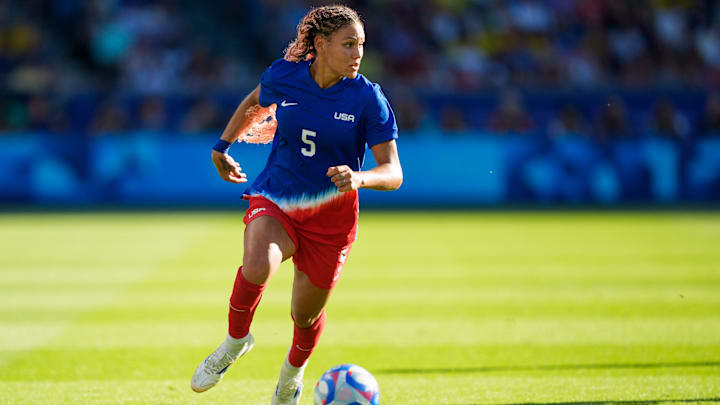But behind the scenes, a very old debate about global soccer is heating up: how much should players balance their commitments between clubs and national teams? Beyond that, is representing the national team still considered an unquestionable honor or a burden? In the most recent example of this, USMNT coach Mauricio Pochettino came under fire for releasing some of his key players prematurely, before the close of the FIFA international window. But it is not as simple as that, and USWNT boss Emma Hayes has thrown the cat among the pigeons with an interesting perspective that perhaps changes everything.
Follow MLS Multiplex on X (Twitter).
Hayes, who concurrently manages one of the most illustrious national teams in the world, does not even seem to contemplate releasing her players early. So, what makes her so certain?
Release or Keep Players? Pochettino's Decision

Let's start right at the heart of the controversy: Pochettino decided to release key USMNT players early. Big names like Christian Pulisic, Weston McKennie, and others returned to their clubs while the USMNT was still under international commitments. This brought up a very critical question: how do international duties conflict with club responsibilities?
As expected, not everyone took too well with the decision that Pochettino made; he was accused of devaluing national team games, as though club interests outweigh everything. And the criticism, fair enough. After all, who decides when a player should be available for his country? On paper, it should be representing the national team first. But in reality, it is not quite that simple-especially not when there's money at play.
Emma Hayes' Perspective
Now, let's look at the counterpoint from Emma Hayes. The USWNT head coach gives a view that sharply contrasts with Pochettino's logic. While the Argentine coach sounded more interested in conserving his players for club duties, Hayes persists in defending the national team as an honor that cannot be overlooked.
Hayes then continued by saying that FIFA dates are scheduled way in advance and clubs know them, so as far as she is concerned, there is no excuse not to plan and take into account what players can fulfill with both club and national team commitments. "I think we have to deal with it case by case, but it's part of the player's job to manage that," she told Forbes.
What Hayes brings to the table is a more humanized yet traditional view on soccer. For her, players should be grateful for the opportunity to represent their countries: "All leagues know this window. I know how to handle players. We have 26 players, so we're not in a position to play any one player in more than two games, which is my goal." And, of course, that does make a modicum of sense. Representing your country is any athlete's dream. The players would hate to miss out on that opportunity, Hayes suggests.

Club or Country: Where's the Balance?
This debate over club or country isn't new. Every time there is an international break, this same issue flares up. Pochettino's case is just another example of a dilemma which is decidedly far from a clear resolution. The reality of the matter, of course, is that with the game of soccer becoming an ever-larger business, clubs increasingly press players to meet their demands. After all, it is the clubs that pay those astronomical salaries.
On the other side, however, is the mental burden and dedication required in putting on a national team jersey. Emma Hayes managed to put it best: "To me, this is professional soccer, and playing both for the club and the national team is a fundamental part of what they have to do." And she isn't wrong. One of the sacrifices of being an elite athlete is fulfilling the obligations of both clubs and national teams.
The Weight of Stardom and High Performance
In the midst of that comes another important point-the immense amount of pressure put on elite players from USWNT and USMNT. They are stars at their clubs and central figures for their national teams. And with all of that comes the expectations of very high performance, no matter where they are playing. That can easily become a burden.
What Pochettino and Hayes bring to the fore is the cost these professionals pay for their starring roles both with clubs and internationally. Performance is demanded constantly, along with the requirement to preserve physical and mental health.
Now, the big question has come: what is the balance that has to be articulated between clubs and national teams so as not to push players toward extreme limits? For the time being, an answer remains elusive.
The Road Ahead
Where do we go from here? The contrast between Pochettino's method and Hayes' philosophy enlightens us to the problem that always exists between clubs and national teams-the case in the U.S. is no different. Hayes' approach to the USWNT serves as an example of how coming first takes the team further, while Pochettino's tactic aims at long-term maintenance for the USMNT.
One thing is for sure: the conversation is far from over. While the USWNT still competes at a time as an enforcing unit in women's soccer, built on the core of national pride, the USMNT still attempts to find its space among the best. Decisions like Pochettino's will no doubt help shape that future.
Both coaches, for now, have valid arguments concerning the tricky role the players need to play. On one side is a need to protect the athletes for club competitions while on the other side is a deep sense of responsibility to represent their country. Only time can tell which method reaps more success. One thing is for sure, that with the ongoing tug-of-war between the clubs and national teams, it's the players who remain in the spotlight.
